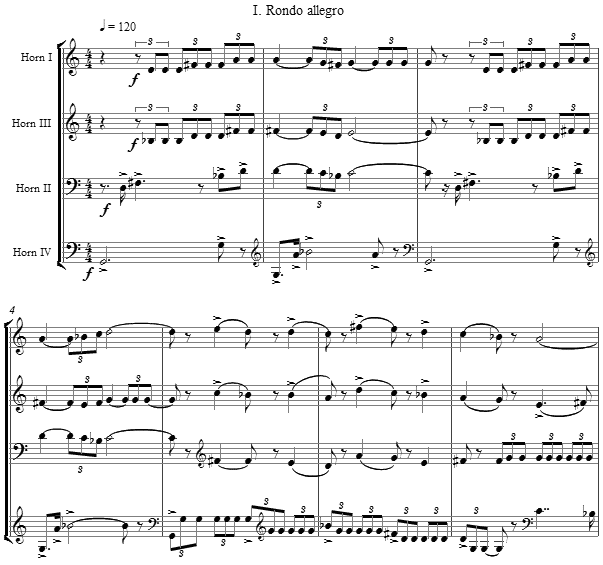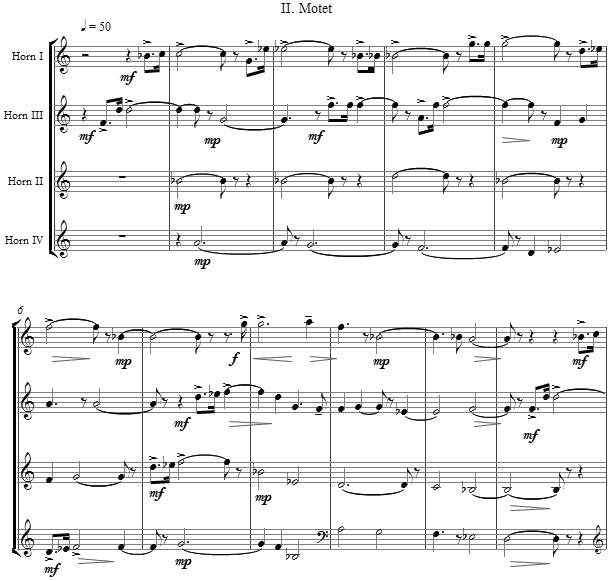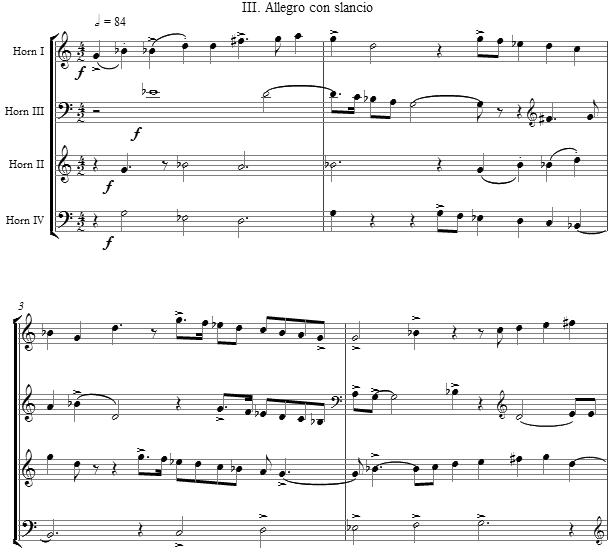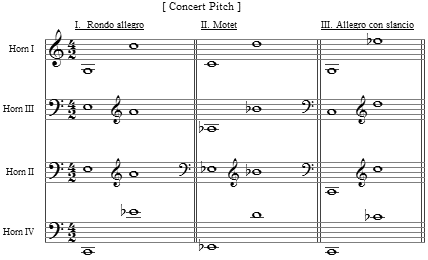Music and Texts of GARY BACHLUND
Vocal Music | Piano | Organ | Chamber Music | Orchestral | Articles and Commentary | Poems and Stories | Miscellany | FAQs
Quartet for Horns - (2007)

for William Melton
i. Rondo allegro
(The following excerpts are transposed for horns; the non-transposing score in C not published below.)
ii. Motet
iii. Allegro con slancio
The range for the four horns were suggested by the horns' relative use in symphonic repertoire and with the kind assistance of William Melton, who suggested wisely that the fourth horn's upper range be limited so as to allow the option for the fourth horn to be played on a tuba in F -- the well known Wagner bass tuba. These ranges, which are greater than many orchestration books advise but which professional players all agree are correct and which inspired the tonic of C for the quartet, are as follows:
[ Full score, 17 pages with cover, circa 8' 20" ]
William Melton
William Melton was born in Philadelphia in 1954 to a native Californian father and a mother who hailed from the plains states. Raised in Los Angeles, he was a horn pupil of the Los Angeles Philharmonic's longtime solo hornist, Sinclair Lott (himself a protégé of Dennis Brain's uncle Alfred, and the then LAPO music director Otto Klemperer). Graduate studies in music history at UCLA were interrupted when, the day before his wedding, Melton auditioned for an orchestral job in Mexico City.
Marriage to a mezzo-soprano and a switch to Mexico’s National Opera Orchestra formed Melton’s penchant for playing opera. Since 1982 he’s been a career hornist with the Sinfonie Orchester Aachen in Germany (Theater-Aachen), and had the chance to indulge his passion for Wagner and Strauss in hundreds of performances of their works. The orchestra also performs the concert repertory, and is currently recording the complete Bruckner symphonies on Super Audio CD (Coviello Classics). In addition, Melton is a member of two horn quartets. The first, Die Aachener Hornisten, has been featured on German network television and concertized in Europe, the Middle East, Asia and Australia. The second, Rhenish Horns, has made a trademark of taking their instruments into unusual locales (in the middle of an African veldt diorama in a Bonn museum, duets on a trans-Atlantic cruise, and a full-dress concert in the sewers of Cologne). Melton is also the arranger for these ensembles, and to celebrate forty years of quartet arrangements, summer of 2008 will bring the issue of many of them in a large collection done for Paxman of London.
The Wagner Tuba: a History
After settling into a mid-19th century farmhouse in the German-speaking cantons of east Belgium, Melton began translating from the German and writing on musical themes. The first biography in English of the composer Engelbert Humperdinck is due in 2009 from Toccata Press, London. Melton’s translation of Michael Hoeltzel’s Hohe Schule des Horns, Mastery of the French Horn, is published by Schott. Research in archives and libraries across Germany has turned up overlooked horn literature, and in the series Forgotten Romantic Works for Horn, Melton applies a scholarly hand to the resurrection of pieces for horn by composers like Albert Dietrich (Schumann’s star pupil), Reinhold Beck (a masterful horn quartet dating from 1909), and Ernst Kunsemüller (a charming 1914 song cycle with obbligato horn by a young composer who died in the trenches of the western front four years later). Other projects dealing with the horn attempt to throw light on the darker corners of the instrument’s history and practitioners. A rehabilitative biography of Richard Strauss’ father Franz (whose reputation had been scuttled by Wagner’s propagandists) for the Journal of the International Horn Society netted Melton the Society’s Harold Meek Award for scholarship in 1999. His massive, serialized history of the Wagner tuba (neither Grove or MGG had answered the basic journalistic questions about its creation) secured him the same award in 2001. The book form of the latter, The Wagner Tuba: a History, is available from Gebr. Alexander of Mainz or Edition Ebenos. In preparation is a comprehensive bibliography of the Romantic horn literature in the tradition of Bernhard Brüchle’s pioneering work.
The score for Quartet for Horns is available as a free PDF download, though any major commercial performance or recording of the work is prohibited without prior arrangement with the composer.
Please note the paper format for printing is in the European A4 size, which can be easily re-sized with most PDF printer applications for an 8½ x 11 inch paper size; the Adobe Reader application is recommended.
Quartet for Horns - Full Score





